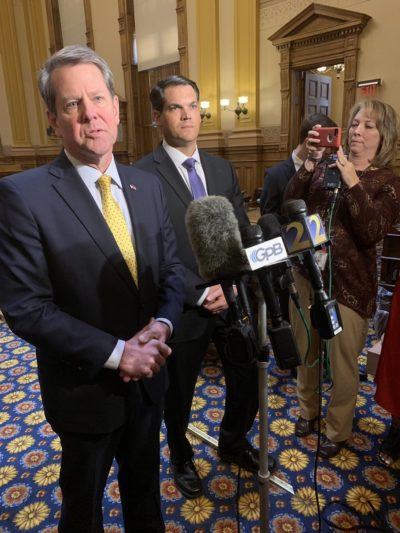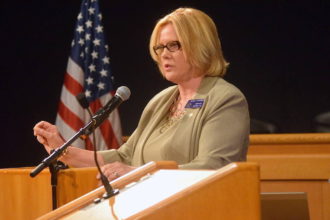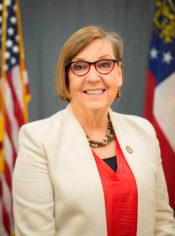The Georgia Senate approved legislation Tuesday to let Gov. Brian Kemp seek health care waivers from the federal government.
The party-line 32-20 vote came after Democrats argued that a full expansion of Medicaid, as outlined under the Affordable Care Act, would cover more Georgians and cost less than Senate Bill 106 would provide.
The legislation has two parts. One waiver would pertain to adding people to the Medicaid rolls. The other would allow Georgia to revise the set-up of the state health insurance exchange, created by the ACA for people who don’t have government or employer coverage.

Sen. Blake Tillery (R-Vidalia), a lead sponsor of the bill, said it would provide “Georgia solutions to Georgia problems.’’ He said the Medicaid system is “already broken’’ and that medical providers are not paid enough to meet their costs of services.
The exchange waiver can help reduce insurance premiums for Georgians, Tillery added.
Sen. Jen Jordan (D-Atlanta) noted that the feds up to now have not approved a Medicaid waiver as envisioned by SB 106 — adding people at up to 100 percent of the federal poverty level, roughly $12,500 for an individual, to the program.
Standard expansion of Medicaid is up to 138 percent of poverty.
Tillery said those above 100 percent of poverty are already eligible for subsidies in the health insurance exchange.
’We don’t know what the bill does, even though we say it’s the most important bill’’ this legislative session, Jordan said, noting that the legislation does not include a financial analysis of potential effects.

Senate Minority Leader Steve Henson (D-Stone Mountain) argued that the bill falls far short of what is needed. It’s a partial Medicaid expansion, he said, and would “cost us more money to cover less people’’ than a full expansion.
Kemp has made health care a priority area for his administration, and has emphasized innovative solutions to problems. “The Patients First Act empowers state leaders to craft flexibility options that will make insurance affordable but – more importantly – make health care available for the most vulnerable,’’ Kemp said in a recent editorial.
Georgia has one of the highest uninsured rates in the nation, and many rural hospitals are struggling financially. Meanwhile, the state ranks at the lower end of health outcomes measures.
A number of health care bills were taken up by the state Senate on Tuesday, including one that codifies an arrangement called “direct primary care.’’
But the debate over the waiver bill was the most compelling.
An argument over numbers
Percentages are a big part of the discussions of the waiver bill.
Under full Medicaid expansion, covering people up to 138 percent of the federal poverty rate, the federal government has pledged to provide 90 percent of the cost for these newly eligible members.

Kemp’s bill would allow a Medicaid waiver of up to 100 percent of poverty. So at 100 percent of poverty, the state presumably would be in line for its regular Medicaid match, which in Georgia would be 67 percent, unless the Trump administration grants an exception for the 90 percent match.
Henson told GHN that Democrats wanted to amend the legislation so it would include Medicaid coverage up to 138 percent of poverty. He also said party members sought to ensure consumer protections under the second type of waiver for the insurance exchange. The Senate, though, blocked allowing any amendments to Senate Bill 106 with a party-line vote.
Based on other states’ experience, the insurance exchange waiver could lead to a reinsurance program that has the potential to stabilize premiums for individuals. But Democrats said the exchange waiver could spark the proliferation of health plans that don’t have the same pre-existing condition protections as the ACA provides.
These ‘’short-term’’ plans, said Sen. Harold Jones (D-Augusta), can exclude coverage for items such as mental health and prescription drugs. He also voiced concerns about insurance practices that would segregate people with health conditions into “high-risk pools.’’
The vote came after a debate of more than two hours.
The bill “is a bad deal for Georgia taxpayers, ‘’ said Sen. Elena Parent, an Atlanta Democrat.

“We’re doing innovation,’’ said Sen. Renee Unterman, a Buford Republican. “Some progress is better than no progress.”
Medicaid expansion has been adopted by 36 states. Republicans who form the elected leadership in Georgia have long opposed expansion here, saying it would be too costly. (Here’s a GHN article on a state fiscal analysis of Medicaid expansion)
Expansion was a big issue in last year’s hard-fought race for governor. Kemp, a Republican, opposed it. But Democratic candidate Stacey Abrams strongly supported Medicaid expansion and made it a centerpiece of her campaign.
Kemp told reporters after the Senate vote that the outcome represents “a great day in the Senate.’’ The bill, he said, would “put Georgians first to reform a broken system.’’
‘Direct primary care’
Meanwhile, the Senate approved including the “direct primary care’’ model in Georgia law.
These arrangements – by which patients pay a monthly fee to a physician for services – are not insurance, said Sen. Kay

Kirkpatrick (R-Marietta), a physician and a sponsor of the legislation. Direct primary care lets people who can’t afford insurance get these medical services, and would also help patients who are insured but don’t want to leave the care of their current physician, Kirkpatrick said.
“A lot of primary care doctors don’t take Medicare,’’ Kirkpatrick told GHN after the 55-0 vote.
Georgia would become the 25th state to have direct primary care on the books, Kirkpatrick said.
The Senate approved House legislation that would require radiologists to tell patients about their breast density and the medical implications of that. Because dense breast tissue has the potential to mask cancerous tumors in mammography results, many women don’t learn they have breast cancer until their disease has reached an advanced stage, advocates of the bill say.
The bill “will actually save lives,’’ said Sen. Lester Jackson, a Savannah Democrat.
It passed unanimously, as did a Senate proposal to allow physicians located in other states to provide telehealth services to Georgia patients.

